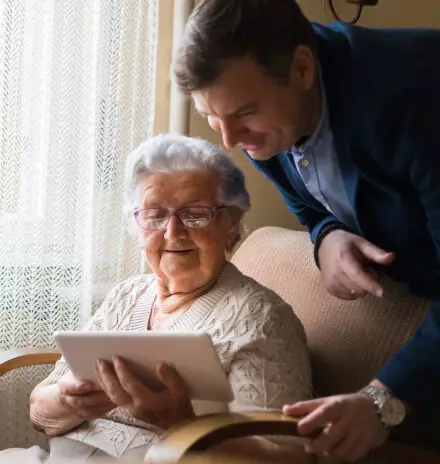
Southeastern Massachusetts
Medicaid Planning Attorney

Medicaid Planning Lawyer Helping Residents in New Bedford, Hyannis, & Easton
Seventy percent of all Americans over age 65 will need long-term care.* This is a scary thought considering that skilled nursing facilities cost locally, on average, about $12,000 to $14,000 per month. Medicare only provides up to 100 days of coverage. Private insurances, such as Blue Cross Blue Shield, only cover the Medicare co-pays. Long-term care insurance is an option for the few seniors who are insurable and can afford the annual premiums. Without long-term care insurance or the ability to private pay, many may find applying for Medicaid (MassHealth) the only viable option.
Let’s start with understanding the difference between Medicare and Medicaid.
*U.S. Dept. of Health and Human Services, 2017
Medicare vs. Medicaid Roles in Nursing Home Care
Medicare is a type of health insurance managed by the federal government that is available to people over age 65. Medicare does cover nursing home care—up to a point. If you are sent to a skilled nursing facility for care after a three-day in-patient hospital stay, Medicare will pay the full cost for the first 20 days. For the next 80 days, Medicare covers most of the charges, but patients must pay $176.00 per day (in 2020) unless they have a supplemental insurance policy to pick up that cost. Medicare does not cover the cost of a person’s long-term care in a nursing home. Those who require long-term care and need assistance to cover the cost will need to qualify for Massachusetts’ Medicaid program, known as MassHealth.
MassHealth is a state and federally run insurance program covering most people’s long-term care expenses, but qualifying for Medicaid can be challenging. At Surprenant, Beneski & Nunes, P.C. , we help clients plan in advance so that they will be able to qualify for MassHealth benefits should they need them down the road.

Medicaid Overview
To be eligible for Medicaid, known as “MassHealth” in Massachusetts, applicants must live in Massachusetts and be both medically and financially eligible.
In general, those persons in a household with low to medium income and assets are financially eligible. Other factors considered for MassHealth financial eligibility include family size, living situation, and type of coverage to be attained. In addition, the individual must fall into an eligible category, determined by: age (some programs are only for persons aged 65 and older), family situation, work history, immigration status, and health care needs.

Medicaid Medical Eligibility
To qualify for MassHealth Standard (to cover the cost of long-term care), the applicant must require one skilled service daily, or have a medical or mental condition that requires a combination of at least three services, including assistance with activities of daily living or nursing services. At least one of the three required services must be a nursing service.
Skilled Services
Skilled services are healthcare services performed by or under the supervision of a registered nurse or therapist. This may include the administration or application of an IV, feeding tube, oxygen, sterile dressings, catheters, or physical, speech, or occupational therapy. Skilled services also cover any professional evaluations or observations that may be necessary under the patient’s care or treatment plan or in an institutional setting.

Nursing Services
Nursing services are performed at least three times per week and can incorporate any of the above-mentioned skilled services, as well as any assistance associated with positioning while in bed or a chair as part of a treatment plan, measurement of intake or output based on medical necessity, administration of medications, and intervention for certain types of behavior that are considered medically to be disruptive, abusive, or hazardous to one’s own health or to the safety of others.
Daily Living Services
Assistance with activities of daily living encompasses all services that are required for the patient to live his or her daily life. These activities range from bathing, toileting, and eating to dressing, transferring to different locations or positions, and general mobility. Assistance with activities of daily living are not covered by Medicare, but can be covered by Medicaid/MassHealth.
Financial Eligibility
Eligibility for Medicaid/ MassHealth is based largely on income and assets. To be eligible, an individual cannot have countable assets that are worth more than $2,000 and cannot have a home with equity of more than $893,000 in 2020 (adjusted annually). For married couples, the family cannot collectively have countable assets worth more than $128,640 (2020) and a home. With proper planning, however, some assets that push applicants beyond eligibility can be re-assigned or protected. Our attorneys have extensive experience helping individuals prepare for long-term care and completing MassHealth/Medicaid applications to pay for long-term nursing home care.
Medicaid Waivers/Home and Community-Based Services (HCBS)
When a person needs assistance with daily tasks but wishes to live at home or in an assisted care facility, not a nursing home, he or she can apply for a Medicaid Waiver. A Medicaid Waiver allows people to live at home with some assistance, or in an assisted living facility. Typically, the applicant will need to show that the assisted living facility or in-home care costs less than living full-time in a nursing home. These waivers are called Home and Community Based Services (HCBS) Waivers. MassHealth also offers a Frail Elder Waiver program designed to help those who need ongoing support services but don’t want to live in a nursing home facility.
MassHealth operates the Frail Elder Waiver (FEW) specifically to help residents who require nursing home level care to receive health care and ongoing support services in their homes or community living residences instead of in nursing homes.

The objective of this program is two-fold. Lawmakers’ intention was to provide residents with an option about their long-term care. Additionally, by preventing the placement of frail individuals in nursing homes, the state saves significant financial resources as the burden of caring for these individuals is shifted onto family caregivers. Despite this, many families and care recipients still prefer this model, as it allows program participants to age in their homes or the homes of family members.
The Frail Elderly Waiver is operated by the Executive Office of Elder Affairs (EOEA). There is a version of this program called the Community Choices Program, which provides more hours of services to those at immediate risk for nursing home placement.
Eligibility for this waiver depends on the age, location, functional ability, and financial status of the applicants. Candidates must be a minimum of 60 years of age. However, those between the ages of 60 and 64 must be physically disabled. All applicants must require the level of care provided in nursing homes, yet they should be willing to receive the care at home. The cost to provide that care cannot exceed what it would cost in a nursing home.
To be eligible for the HCBS Waiver, persons must be financially qualified for MassHealth Medicaid. The 2020 income limit is $2,349 per month for an individual. The income of married couples with both spouses as applicants is considered separately. This means each spouse is allowed up to $2,349 / month in income. When only one spouse of a married couple is an applicant, the non-applicant spouse is able to receive an income allowance from the applicant spouse. This is intended to ensure the non-applicant has enough monthly income to support him / herself. As of 2020, depending on the non-applicant’s financial circumstances, as much as $3,216 / month can be transferred from the applicant to the non-applicant.

MassHealth also considers one’s countable assets, which includes cash, bank accounts, certificates of deposit, and life insurance policies with a face value over $1,500. The limits for an individual and a married couple (both spouses applying for services) respectively are $2,000 and $4,000. When only one spouse of a married couple is applying, the asset limit for the other spouse is up to $128,640 (as of 2020). Their home, if owner-occupied, is considered exempt up to a value of $893,000 in 2020. There are also other exempt assets, such as a vehicle, funeral trusts, and personal valuables.
As with other state Medicaid programs, the applicant’s five-year financial history is considered to prevent the applicant from giving away his / her money to qualify. (This is called the Medicaid Look-Back Period.) Violating the Medicaid look-back rule can be cause for a period of Medicaid ineligibility.
An elder law professional, who is familiar with state Medicaid rules, can determine the exact limits and the best structures for resources to ensure a qualification, while also preserving some of the couple’s net worth for the healthier spouse.
Benefits and Services
It is the goal of this program to help seniors to age in place outside of nursing homes, and as such, the benefits are selected to aid in independent living. Beneficiaries and their caregivers can receive any of the following services:
- Alzheimer’s and Related Dementia Coaching
- Companion Services
- Education Programs
- Goal Engagement Program
- Grocery Shopping / Delivery
- Home Delivered Meals
- Homemaker & Chore Services
- Home Modifications to Improve Accessibility
- Home Health Aide
- Occupational Therapy
- Pre-packaged Medication Delivery
- Personal Care
- Respite Care for the Primary or Family Caregiver – in-home and out-of-home (can be provided in adult day care)
- Skilled Nursing
- Supportive Day Program
- System for Dispensing Medications
- Transitional Services
- Transportation Assistance for Medical and other Appointments
Wander Response System (Reserved for Alzheimer’s and Dementia Patients) - Cellular Personal Emergency Response Services
We can help guide you through the best option for you or your loved one. Our goal is always to help our clients keep as much of their assets as possible while obtaining the level of care they need.
Exempt Assets and Countable Assets:
What Can you Keep and What is at Risk?
To qualify for Medicaid, applicants must pass fairly strict tests on the total assets they can keep. To understand how Medicaid works, we first need to review what are known as exempt (non-countable) and non-exempt (countable) assets.
Exempt assets are those which Medicaid will not take into account when a person applies for Medicaid benefits. In general, the following are the primary exempt assets:

- Home (primary residence), for a single person, home equity must be less than $893,000 (in 2020). The nursing home resident is required to declare “intent to return home”, even if this never actually takes place.
- $2,000 cash or other countable assets.
Personal belongings and household goods. - One car or truck.
- Burial spaces and certain related items for applicant and spouse.
- Up to $1,500 per person as a burial fund for both applicant and spouse.
- Irrevocable, prepaid funeral contract.
- Cash value of life insurance if face value is $1,500 or less.
All other assets are generally non-exempt, and are counted. Basically, all money and property, and any item that can be valued and turned into cash, is a countable asset unless it is one of those assets listed earlier as exempt.
Countable assets include:
- Cash, savings, and checking accounts, credit union share and draft accounts
Certificates of deposit - U.S. Savings Bonds
- Individual Retirement Accounts (IRA), Keogh plans, 401K plans, 403B plans
- Trusts (depending on the terms of the trust)
- Real estate (other than the primary residence)
- A second car, truck or mobile home
While the Medicaid rules themselves are complicated and tricky, it’s safe to say that a single person will qualify for Medicaid if she has only exempt assets plus cash and/or money in the bank, up to $2,000.


Strategies for Qualifying for MassHealth
At Surprenant, Beneski & Nunes, P.C. , we understand that each client’s situation is unique. We provide our clients with MassHealth planning strategies tailored to their income level and individual financial situation. Recommended strategies should address some of the challenges that could present themselves based on your individual circumstances. Below are some of these challenges and potential solutions:
Please bear in mind that not every strategy will be appropriate or applicable to your situation.
5 Reasons Why You Should Hire an Attorney for MassHealth Planning

Challenge: If you are over the asset limit, spend-down is an option, but how can you divest yourself of assets without causing Medicaid disqualification?
Potential Solution:
There is a great deal of confusion regarding the spend–down of assets for Medicaid qualification.
For a single person, who can only keep $2,000 in countable assets in Massachusetts, that individual may find him or herself wondering what the money can be spent on without causing any Medicaid disqualification.
For a married couple, the rules are even more complex. The community spouse, (i.e., the at-home spouse) may generally keep roughly all of the couples assets up to a maximum of $128,640 (in 2020). Depending upon the couple’s resources, there may be a substantial amount of money which needs to be spent before the nursing home spouse qualifies for Medicaid.

This is often where the confusion begins because there is so much misinformation about the kinds of things on which money can be spent. For that reason, we have put together the following checklist to help people better understand the law — and where the money can be legally spent.
For someone who is pursuing Medicaid eligibility, the following are the types of spend-down items, in no particular order, that should be considered:
1. Purchase irrevocable prepaid funeral plans
The rules regarding funeral plans are complex so you should only deal with a funeral home knowledgeable in this type of planning.
2. Purchase a new car
It is perfectly acceptable to purchase a new car. The purchase price comes out of the applicant’s spend-down even if the car is for the community spouse or for a single person going into the nursing home.
3. Payment of nursing home expenses
Of course, nursing home expenses and other healthcare costs can be paid as part of a spend-down.
4. Purchase of a new home
Since the home is an exempt asset, in some instances purchases of a new home make sense from a Medicaid-planning standpoint.
5. Make home improvements
Home improvements are often an excellent use of funds. For instance, the community spouse might fix the roof, get a new air-conditioning system, new carpeting, new furniture, etc. The intention here is to fix the house up so that, hopefully, no other repairs will be needed to be done during the lifetime of either spouse. This is especially important since, in many cases, the community spouse will have to spend down to the maximum of $128,640 (in 2020) and may no longer have the resources necessary for large lump sum expenditures that may occur in the future.
6. Buy household goods or personal effects
Once again, the intention is to have the community spouse purchase things needed to keep the household running, eliminating the need for major expenditures down the road.

7. Vacation
This can be a good idea for the community spouse at a time when there has been a long struggle to keep a loved one at home. The community spouse may be exhausted and a well-deserved vacation could be rejuvenating. Believe it or not, the entire cost of that vacation can be part of the spend-down.
These are, of course, not the only appropriate items for a spend-down. There are other expenses which may also qualify. The main rule to keep in mind is that whatever goods or services purchased must be at fair market value and, generally, the purchases must be made prior to the date you need MassHealth coverage to start..
Also, don’t let anyone tell you that anything spent must be done solely for the benefit of the nursing home spouse. On the contrary, virtually anything that benefits the community spouse will also benefit the nursing home spouse.
Finally, keep in mind that while some spend-down strategies will not work as well for a single person, others will. As always, consult an experienced elder law attorney for guidance.
Challenge: 5-Year Look Back Period
To approve an applicant, MassHealth needs to see that the person doesn’t have the means to pay for his or her own services. MassHealth has a 5-year look-back period which means that an individual needs to have taken steps to protect his or her assets at least five years before applying for benefits. An applicant who has given away significant assets within the previous five years may have his or her application denied.
In some circumstances, MassHealth may put lien on a property to ensure that, if the property is sold during the applicant’s lifetime, MassHealth gets the proceeds to pay back at least a portion of the money spent on the individual’s care. This could prevent that individual from being able to pass ownership of the family home to a relative. Because members must have few other assets to qualify for coverage, MassHealth’s efforts to recoup its costs could prevent some members from leaving any assets to their children and other loved ones.

Potential Solution:
Trusts are a tool that many people take advantage of in this situation. Creating the right type of trust may allow Massachusetts residents to control who will receive their assets without making those assets accessible to MassHealth or losing their coverage.
There’s no one-size-fits-all trust for MassHealth planning. The type of trust that best protects one person may leave another exposed to MassHealth estate recovery. Also, not all trusts are legally compliant with MassHealth planning. MassHealth may reject an applicant’s request for coverage if it determines that the applicant has used a trust to improperly shield assets. MassHealth is in the business of controlling costs. To avoid a rejection, it’s advisable to work with who understand the legal complications around creating a MassHealth-compliant trust.
Challenge: I don’t need nursing home care, but I do need financial assistance for in-home care.
Potential Solution
Trusts are a tool that many people take advantage of in this situation. Creating the right type of trust may allow Massachusetts residents to control who will receive their assets without making those assets accessible to MassHealth or losing their coverage.
There’s no one-size-fits-all trust for MassHealth planning. The type of trust that best protects one person may leave another exposed to MassHealth estate recovery. Also, not all trusts are legally compliant with MassHealth planning. MassHealth may reject an applicant’s request for coverage if it determines that the applicant has used a trust to improperly shield assets. MassHealth is in the business of controlling costs. To avoid a rejection, it’s advisable to work with who understand the legal complications around creating a MassHealth-compliant trust.
Challenge: Husband needs to go into a nursing home and has a pension. Can the pension be transferred to the wife so that she can use it to pay bills?
Potential Solution
The legal team of Surprenant, Beneski & Nunes have had success using in-Marriage QDRO to allow couples to keep more income when one spouse needs Medicaid to pay for long-term care. QDRO stands for Qualified Domestic Relations Order which is usually used in the context of a divorce proceeding. However, a Court can issue an “In-Marriage QDRO” to be transferred to the in-community spouse” when the spouse (who’s pension it is) needs long-term care. This can make a significant difference in the in-community spouses monthly income allowing them to remain at home and receive the healthcare or other local support they might need. This same strategy may be applicable to retirement accounts. Being a more advanced strategy, it is important to request a consultation to see if your circumstances are an appropriate match.
Advance Planning
In contrast to the above scenario, advanced planning for MassHealth is always the best option. The earlier you begin planning, the better. Once your plan is in place, you’ll rest easier knowing that if you need nursing home care, you have a strategy to qualify for coverage without spending your hard-earned money and assets. Most MassHealth planning strategies require a 5-year lookback period, so the sooner you speak to a lawyer and begin the process, the better.

Why Choose Us?
If you or your loved one needs long-term care in a nursing home or in the community, it is well worth the investment to consult with an elder law attorney, so you are well-informed about your options. At Surprenant and Beneski, P.C., we have extensive experience advising clients on Medicaid planning and programs in Massachusetts. Our partners, Daniel Surprenant and Michelle Beneski, are certified as elder law attorneys by the National Elder Law Foundation, making our firm uniquely qualified to assist you with Medicaid planning. If you have questions about Medicaid or any other aspect of long-term care planning, we can help.
When you consult us, we will provide you with knowledge, compassion, and the personal attention you deserve. The sooner you call us, the sooner we can help you qualify for Medicaid, while also protecting your assets and your loved ones.

Contact Us Today
Our Office Location
New Bedford
35 Arnold St, New Bedford, MA 02740
Easton
45 Bristol Drive, Easton, MA 02375
Hyannis
336 South Street, Hyannis, MA 02601
